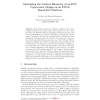Free Online Productivity Tools
i2Speak
i2Symbol
i2OCR
iTex2Img
iWeb2Print
iWeb2Shot
i2Type
iPdf2Split
iPdf2Merge
i2Bopomofo
i2Arabic
i2Style
i2Image
i2PDF
iLatex2Rtf
Sci2ools
114
click to vote
ARC
2009
Springer
2009
Springer
Optimizing the Control Hierarchy of an ECC Coprocessor Design on an FPGA Based SoC Platform
Abstract. Most hardware/software codesigns of Elliptic Curve Cryptography only have one central control unit, typically a 32 bit or 8 bit processor core. With the ability of integrating several soft processor cores into one FPGA fabric, we can have a hierarchy of controllers in one SoC design. Compared to the previous codesigns trying to optimize the communication overhead between the central control unit and coprocessor over bus by using different bus protocols (e.g. OPB, PLB and FSL) or advanced techniques (e.g. DMA), our approach prevents overhead in bus transactions by introducing a local 8 bit microcontroller, PicoBlaze, in the coprocessor. As a result, the performance of the ECC coprocessor can be almost independent of the selection of bus protocols. To further accelerate the Uni-PicoBlaze based ECC SoC design, a Dual-PicoBlaze based architecture is proposed, which can achieve the maximum instruction rate of 1 instruction/cycle to the ECC datapath. Using design space exploration...
| Added | 19 May 2010 |
| Updated | 19 May 2010 |
| Type | Conference |
| Year | 2009 |
| Where | ARC |
| Authors | Xu Guo, Patrick Schaumont |
Comments (0)

